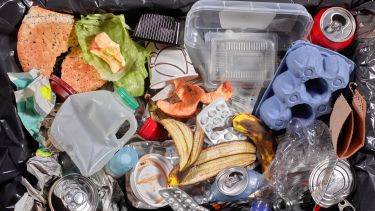Reducing Plastic Packaging and Food Waste through Product Innovation Simulation
Plastic waste has recently been recognised as a serious environmental problem, but this issue is also wrapped up with the issue of food waste, as a lot of plastic waste comes from food packaging. This project aims to understand the most effective ways to innovate to reduce food and plastic waste.

Project description
Around 41% of plastic packaging is used for food in the UK, which generates 1 million tonnes of packaging waste per year. Food packaging has increased by 1844% since 2007, but only 1 third of it is currently recycled. Many consumers have responded by boycotting plastic packaging, but without plastic packaging, food can have a shorter shelf life. Ending the use of plastic food packaging might mean risking an increase in food waste (and risk from food borne illnesses!).
Food waste is also a massive environmental issue. In the UK, around 10 million tons of food are wasted every year, with the average family (i.e. a household containing children) spending £700 a year on food that is wasted. 31% of avoidable household food waste is caused simply by a mismatch between packaging and portion sizes, and household food habits.
Up to a third of the resources used to produce food could be saved by eliminating food waste, so it is critical that we do not increase food waste when exploring new forms of packaging that cut down on plastic waste.
There are lots of options for households and for the food industry which could address the issue of plastic waste, especially around redesigned and alternative forms of packaging but it is difficult to know what the best solutions are. There is so little evidence on this topic that it is hard to know what the consequences of any change will be, and this is preventing swift action to reduce plastic waste in the food system.
This project will help businesses, government and others to understand the most effective ways to innovate to reduce food waste and plastic packaging waste. We are building on the work of WRAP and University of Sheffield teams, to update the Household Simulation Model (HHSM). This will allow the trade offs between plastic waste and food waste to be documented in much more detail, so that the right decisions on food packaging can be made.
Project outputs
We are bringing together:
- data on plastic packaging options provided by WRAP,
- insight into household behaviour around food packaging informed by social science research conducted by a team based at the University of Sheffield,
- specific information about fresh produce and how it degrades over time, provided by a team at the University of Greenwich,
- and insights from big data on supply chain processes and impacts.
Funder information
This £746,618 project is funded as part of the UKRI Smart Sustainable Plastic Packaging challenge (SSPP). We also plan to work closely with the Many Happy Returns project.
Staff
External members
- Martin Torrejon, Postdoctoral Research Associate at City University, Virginia


